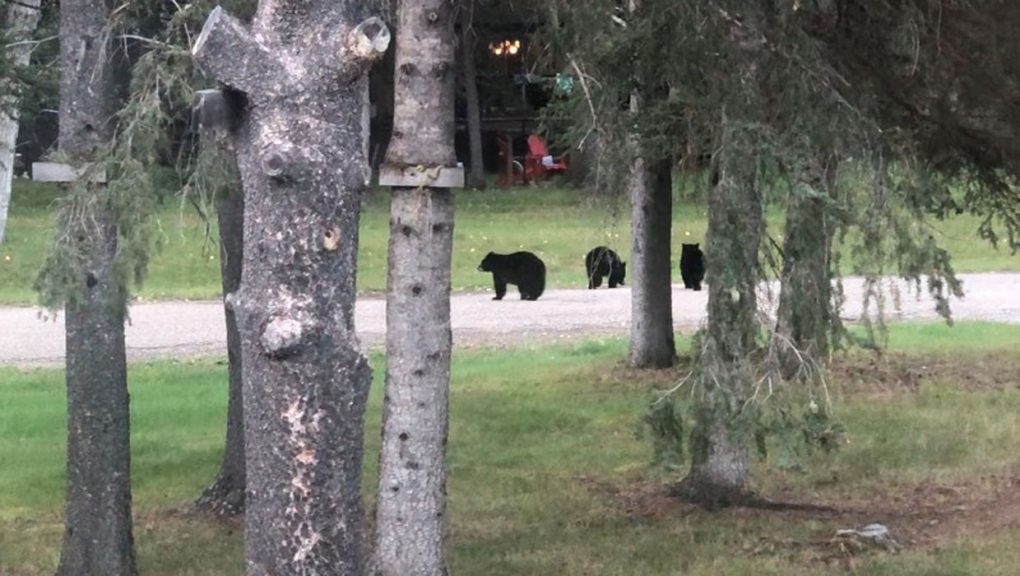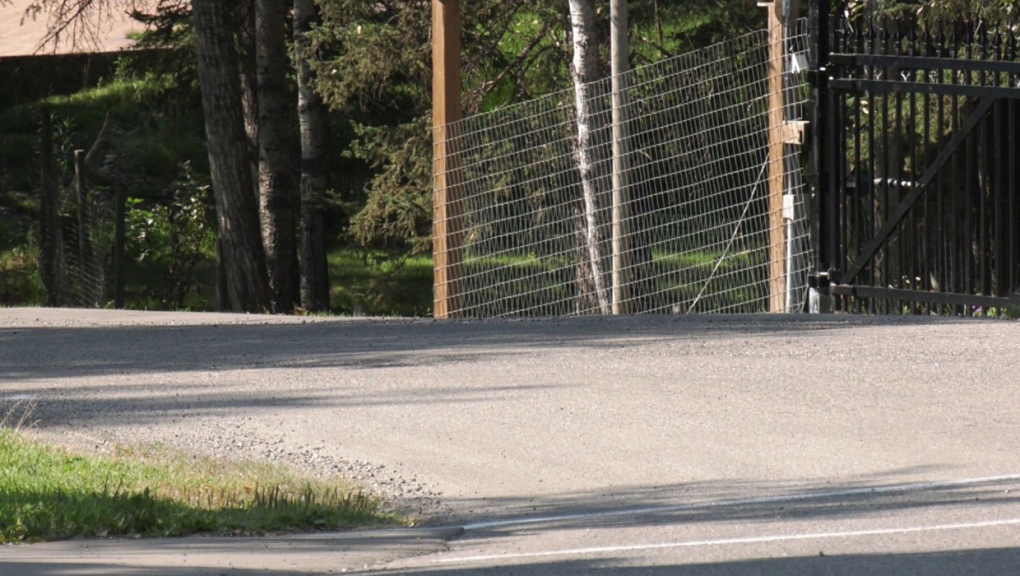Bragg Creek residents want changes following the death of a black bear
Residents in a community outside Calgary are looking for solutions for a trio of bear cubs whose mother had to be euthanized last month.
A black bear was shot and killed by officers from Alberta Environment and Parks on Aug. 28 in Bragg Creek, after it got into a resident’s garbage.
It had three seven to eight-month-old cubs with her that have now been left orphaned.
Resident Ania Bergmann says the bear had recently broken into a shed stored with grain, but is concerned now that the cubs are now without a mom.
“They (fish and wildlife officers) wanted to shoot the three cubs, however a number of neighbours got involved and advocated for the cubs and as a result of that, the cubs were left alive and now they are wandering around the area,” said Bergmann.
Bergmann fears that officers will eventually shoot the cubs, due to the close proximity they have had with humans.
On Wednesday, Bergmann along with others, plan on holding a public meeting at Bragg Creek Provincial Park on how best to address bears and human contact moving forward.
“Spread the knowledge and spread the word about bear safety and bear awareness,” she said.
“In addition to that, have an open discussion about how bears are treated when they come into contact with humans. What are the options for their potential rehabilitation?”
Bergmann adds that she would like to see the cubs relocated and taken to a wildlife rehabilitation institution, similar to the Cochrane Ecological Institute (CEI).
 (Supplied)
(Supplied)
A statement issued by Alberta Environment and Parks says that wildlife enforcement officers will “continue to monitor the three cubs.”
“If the cubs are located, Fish and Wildlife will make a decision for both the benefit of the bears and public safety,” said spokesperson Hayley Martin.
“Orphaned black bear rehabilitation is not considered necessary in this case as the cubs are old enough to be able to forage on their own.”
Martin adds that “this is an unfortunate situation caused by human actions.”
“Leaving unsecured garbage, which became an attractant for bears actively foraging this time of year to accumulate fat stores for winter,” she said.
“We encourage Albertans to take precautions and secure any attractants when living or recreating in bear country, to protect themselves and Alberta's bears.”
Martin adds that relocation is not an intervention that is needed.
“The best option is always to leave animals in the wild whenever possible,” she said.
“Research on wildlife rehabilitation indicates that human intervention is likely to cause greater harm to these cubs based on their age.”
Martin says that CEI is not able to rehabilitate black bears after their license was pulled last year.
“Alberta Environment and Parks decided to remove CEI's authorization to rehabilitate black bear cubs at their facility,” said Martin.
“This decision has been extended to the 2022-23 fiscal year, since the issue is still before the courts. CEI is still able to continue to rehabilitate other wildlife.”
Conservation biologist Lisa Dahlseide says the officer was following the protocol with shooting the sow, but she does not agree with it.
She says she’d like to see the cubs rehabilitated.
“If we can adopt procedures in place that can support the viable bear population, I believe the communities would rather have that,” she said.
Dahlseide adds that other provinces can rehabilitate black bears and suggests Alberta should give more wildlife institutes the opportunity to do the same.
“We see that they accept over 80 cubs annually at their rehab facilities – why does Alberta only have three?” said Dahlseide.
“It begs that question, what happened to all these orphans?”

Alberta is home to 40,000 black bears and 10,000 cubs are born every year here. Approximately 3,500 of them will die from natural causes before they reach one year of age.
AEP says it is estimated that 30 percent of male cubs will survive to the age of five years old in the wild.
The Alberta government says although black bear cubs normally remain with their mothers for up to 17 months, they are self-sufficient at five months.
The public meeting will begin at 6 p.m.
CTVNews.ca Top Stories

Trump threatens to try to take back the Panama Canal. Panama's president balks at the suggestion
Donald Trump suggested Sunday that his new administration could try to regain control of the Panama Canal that the United States “foolishly” ceded to its Central American ally, contending that shippers are charged “ridiculous” fees to pass through the vital transportation channel linking the Atlantic and Pacific Oceans.
Man handed 5th distracted driving charge for using cell phone on Hwy. 417 in Ottawa
An Ottawa driver was charged for using a cell phone behind the wheel on Sunday, the fifth time he has faced distracted driving charges.
Wrongfully convicted N.B. man has mixed feelings since exoneration
Robert Mailman, 76, was exonerated on Jan. 4 of a 1983 murder for which he and his friend Walter Gillespie served lengthy prison terms.
What's open and closed over the holidays in Canada
As Canadians take time off to celebrate the holidays, many federal offices, stores and businesses will be closed across the country on Christmas Day and New Year's Day.
Can the Governor General do what Pierre Poilievre is asking? This expert says no
A historically difficult week for Prime Minister Justin Trudeau and his Liberal government ended with a renewed push from Conservative Leader Pierre Poilievre to topple this government – this time in the form a letter to the Governor General.
opinion Christmas movies for people who don't like Christmas movies
The holidays can bring up a whole gamut of emotions, not just love and goodwill. So CTV film critic Richard Crouse offers up a list of Christmas movies for people who might not enjoy traditional Christmas movies.
More than 7,000 Jeep SUVs recalled in Canada over camera display concern
A software issue potentially affecting the rearview camera display in select Jeep Wagoneer and Grand Cherokee models has prompted a recall of more than 7,000 vehicles.
'I'm still thinking pinch me': lost puppy reunited with family after five years
After almost five years of searching and never giving up hope, the Tuffin family received the best Christmas gift they could have hoped for: being reunited with their long-lost puppy.
10 hospitalized after carbon monoxide poisoning in Ottawa's east end
The Ottawa Police Service says ten people were taken to hospital, with one of them in life-threatening condition, after being exposed to carbon monoxide in the neighbourhood of Vanier on Sunday morning.

































